The Washington D.C.-based organization regards a central bank digital currency as a threat to citizens’ privacy.
A report from the Cato Institute contends that a central bank digital currency issued by the United States government, or CBDC, would usurp the private sector and imperil citizens’ privacy and fundamental liberties.
The federal government is investigating the creation of a CBDC, which would essentially be a digital currency guaranteed by the Federal Reserve. According to the Cato Institute, a Washington, D.C.-based organization that conducts policy research, this poses a clear and present threat to citizen privacy and the free market.
In the report’s conclusion, the institute did not pull any punches, saying that CBDCs “should have no place in the American economy” and that “Congress should explicitly prohibit the Federal Reserve and the Department of the Treasury from issuing a CBDC in any form.”
According to the Cato Institute, the primary arguments against developing a government-issued CBDC include concerns over monitoring and control, destabilization of the free market, and cybersecurity.
“The private sector is not immune, but it has the distinct advantage of being more decentralized than the federal government,” write the report’s authors. “Whereas a breach at the Internal Revenue Service puts all 333 million Americans at risk, a breach at a private financial institution would only affect a fraction of citizens.”
The Federal Reserve estimates that approximately sixty percent of global financial liabilities and claims are denominated in U.S. dollars so these privacy concerns may extend beyond the United States.
It is currently unknown if and when the United States will issue a CBDC; however, the Federal Reserve’s FedNow service, a state-run immediate transaction banking portal, is scheduled to launch in July.
Cointelegraph’s Brayden Lindrea previously reported that Republican majority whip Tom Emmer called CBDCs potentially “dangerous” for both individual users and the government’s political opponents, highlighting the continued sensitivity of the topic on Capitol Hill.
Read Also: Uphold claims it never delisted XRP and holds $1.04 billion worth of the tokens in reserves
Disclaimer: The information provided in this article is for informational purposes only and should not be construed as financial or investment advice. Cryptocurrency investments are subject to market risks, and individuals should seek professional advice before making any investment decisions.


Comments are closed.